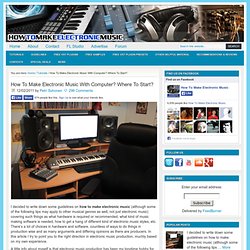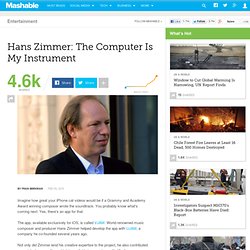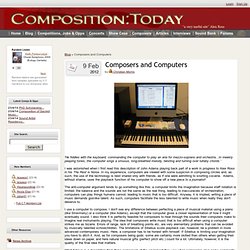

Marshall Rogalski’s stream. Marshall's work. Herbie Lutvak’s stream. What Lutvak's work looks like. What is Ableton Live? How To Make Electronic Music With Computer? Where To Start? I decided to write down some guidelines on how to make electronic music (although some of the following tips may apply to other musical genres as well, not just electronic music) covering such things as what hardware is required or recommended, what kind of music making software is needed, how to get a hang of different kind of electronic music styles, etc.

There’s a lot of choices in hardware and software, countless of ways to do things in production wise and as many arguments and differing opinions as there are producers. In this article I try to point you to the right direction in electronic music production, muchly based on my own experience. A little info about myself is that electronic music production has been my longtime hobby for years and I’ve been creating tunes on such genres as trance, downtempo, ambient and experimental.
Some of my songs has been released commercially through record labels and has also been used in a film project. So, without further ado, let’s begin! 1. 2. Want To Make Music But Don’t Understand It? Try ‘Daft Punk In a Box’ Making music is great because you get to DJ massive nightclubs in Las Vegas for millions of dollars a year and have an aggressive, European-style haircut based on the metric system.

Okay, that’s one vision of it… but how do you get there without, you know, learning how to play music? Plenty of tools exist for making music with the help of artificial intelligence — the humble arpeggiator is found even in otherwise handmade songs. That technology can skip up, down, and around arpreggios even if the person playing them has never had a lick of musical theory, but some new software we’ve been playing around with today goes a step further. It’s called Liquid Notes, from Re-Compose, and it can reconfigure the harmony to any song you’ve composed in MIDI. Hans Zimmer: The Computer Is My Instrument. Imagine how great your iPhone cat videos would be if a Grammy and Academy Award winning composer wrote the soundtrack.

You probably know what's coming next: Yes, there's an app for that. The app, available exclusively for iOS, is called VJAM. World-renowned music composer and producer Hans Zimmer helped develop the app with UJAM, a company he co-founded several years ago. Not only did Zimmer lend his creative expertise to the project, he also contributed one original composition, which is available to use, along with 10 other songs/themes, with the free version of the app. "We feel we have created a basic app that does something very powerful," UJAM CEO Axel Hensen tells Mashable. Composers and Computers. 'He fiddles with the keyboard, commanding the computer to play an aria for mezzo-soprano and orchestra...In meekly peeping tones, the computer sings a sinuous, long-breathed melody, twisting and turning over lullaby chords.' I was astonished when I first read this description of John Adams playing back part of a work in progress to Alex Ross in his The Rest is Noise.

In my experience, computers are viewed with some suspicion in composing circles and, as such, the use of the technology is best shared only with friends, as if one were admitting to snorting cocaine. Adams, without shame, uses the playback function of his computer to show off a new piece to a journalist! The anti-computer argument tends to go something like this: a computer limits the imagination because staff notation is limited; the balance and the sounds are not the same as the real thing, leading to inaccuracies of orchestration; computers can play things humans cannot, leading to music that is too difficult. Liz Lane. Virtual composer makes beautiful music—and stirs controversy. When most of us think about a machine composing musical pieces, we think of primitive songs coming out of a HAL 9000 that could be suitable for a child's toy, but nothing that music lovers would actually enjoy.

That's because most of us haven't heard of Emily Howell. No, that's not a person—it's the name of a computer program written by University of California, Santa Cruz professor David Cope that, after nearly three decades of work, is about to release, uh, "her" first CD through Centaur Records. Cope is Dickerson Emeriti Professor at UCSC—he attempted to retire years ago because he didn't want to go to meetings anymore—teaching graduate courses in music composition and computer-assisted composition. Cope is also an Honorary Professor of Computer Science at Xiamen University in China and is often ascribed as a computer scientist, though he insists that he is a music professor first, not a CS professor.
How it all got started Experiments in Musical Intelligence. MMJ Individual Project-Puckett.